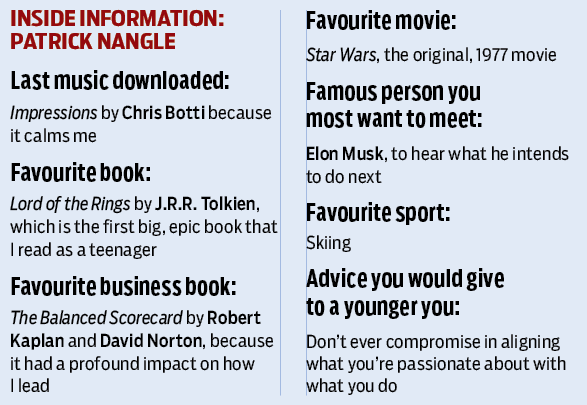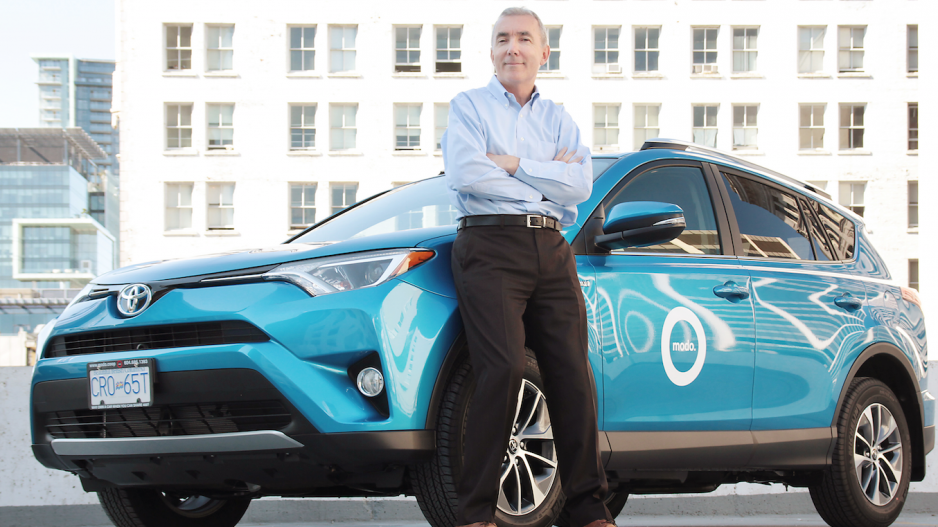Patrick Nangle’s experience running companies with up to $1.6 billion in annual revenue may invite the question as to why he would take the top job at Modo – the car-sharing co-operative venture that has 40 employees and a budget of about $10 million.
Even the chairman of Modo’s board of directors, William Azaroff, said he was initially surprised that a man with Nangle’s resume would express any interest in the car share company’s top job.
“I was amazed that he would seriously consider Modo,” Azaroff told Business in Vancouver.
“It’s an incredible fit where we’ve got someone of a calibre that we’ve never been able to attract before. I hope that says something about Modo and car-sharing and the opportunities in front of us.”
Nangle spent three and a half years as CEO of parcel-delivery giant Purolator, a $1.6 billion operation with 11,000 employees and a fleet of 4,000 vehicles.
He left that role on July 8; after a one-weekend break, he launched into his new job at Modo on July 11.
Purolator was not the first large venture that Nangle has helmed. Years before, he headed Neopost’s operations in the Americas, which had sales in the $500 million range.
“I like to believe that I don’t have so big an ego that it would make a difference [to head a smaller venture],” Nangle said while at a small table in his new office in the landmark, 104-year-old Rogers Building at the corner of Granville and West Pender streets.
He is overseeing a renovation of Modo’s 2,300-square-foot headquarters on the structure’s second floor. But no matter how improved the office becomes, it will have a feel vastly different from the glass tower in suburban Toronto where Purolator’s executives hold meetings.
Nangle, 56, said there were two reasons for his decision to leave Purolator – one was that it was the right time for the company to get a new leader; the other was that it was the right time for him to return to Vancouver.
Purolator had carried out the strategic plan that Nangle put in place in early 2013, soon after he started with the company, and it had reached a pivotal juncture. The courier was at a point where the next phase of growth required a CEO who would be committed for the next three to five years, he said.
Nangle was not ready to make that commitment.
“I had to think about what was more important to me,” he said. “It was a natural time to separate [from Purolator] so I tendered my resignation.”
Anyone who was reading the tea leaves could have predicted that Nangle’s stint at Purolator would not last too long because his attachment to Vancouver was so strong.
Although his roots were in Ontario – he was born in London, Ontario, and did his undergraduate degree at that city’s Western University – Nangle moved to Vancouver in 1984 to pursue an MBA in international business at the University of British Columbia.
He loved Vancouver. Though he had a passion to see the world and live internationally, he vowed when he graduated, as the city was celebrating Expo ’86, that he would eventually move back to West Coast.
His career went according to plan.
First came a job at multinational printing company Moore Corp., which moved him to Toronto briefly before sending him to Europe.
Stints in the Hague, Netherlands, and Lausanne, Switzerland, followed.
Next came a job at the telecom Ascom Autelca AG in the Swiss capital of Bern before another short stint in Toronto and then some time in the U.S.
Mailroom-equipment maker Neopost had bought the mailing-system division of Ascom that Nangle headed, and wanted Nangle to run the operation out of the small town of Trumbull in Connecticut.
Throughout it all, however, his heart stayed in B.C., not a little because of the province’s natural beauty and outdoor possibilities.
“I love to ski,” he said. “It’s a big passion for me. I like to hike and ride my bike and all that stuff.”
When he lived in Connecticut, he bought recreational property in Whistler and visited the province frequently.
Perhaps it was the buzz around the 2010 Winter Olympics, but not long before the Games, Nangle decided to move back to B.C.
Richmond-based Digital Dispatch was seeking a CEO and Nangle jumped at the chance.
There, he oversaw a company that provided in-vehicle technology for taxis.
A couple of years later he embarked on a short stint at Vancouver’s PNI Digital Media Inc., which also developed software.
All the while he was developing a niche as a tech executive, which prepared him for Modo as the co-op increasingly relies on technology to monitor use of its vehicles and ensure they are in productive locations. A side business within Modo is its software division, which contributes a small slice of its revenue from licensing that software to other car-share companies.
Regardless, Nangle left PNI in early 2013, after a headhunter called to ask if he would be interested in being Purolator’s CEO. As excited as he was about the new job, Nangle’s wife Carmelita – once his high-school sweetheart – stayed in Vancouver at their Point Grey home and made frequent visits to Mississauga, where Nangle bought a condominium.
“We bought a house in 2011 that my wife and I got into the shape that we wanted it to be in for years and years,” he said. “So I kept the house as I fully intended to come back to Vancouver.”
Once at Modo, his first task was to put together a strategy to achieve his goals for the company.
Could that mean more mergers? After all, Modo merged with Victoria Car Share Co-op in 2014 and has since significantly increased membership and the fleet in B.C.’s capital region.

“We’ll see,” Nangle said.
“[Mergers] are on the radar. We’re just in a process right now where my commitment to the board is that by the end of this year, we’ll have a strategy in place.”
He is sure about one thing: Modo will be profitable.
A common misunderstanding people have about co-operative businesses is that co-ops are not intended to be profitable.
Nangle makes clear, however, that being a co-op is different from being a non-profit business. Modo is a business that either reinvests its profit or distributes the profit among its member-owners.
Modo, which started in 1997 as the Co-operative Auto Network, has about 17,000 members and Nangle is quick to add that membership rolls are increasing daily.
One of the biggest differences between Modo and Vancouver’s other car-sharing companies – Car2Go, Evo and Zipcar – is that members have the option of investing $500 as a refundable share purchase.
Members choosing this option get discounted hourly rates, a different fee structure for per-kilometre usage and eligibility for corporate dividends.
About 61% of the members have chosen that model. Members’ other option is to pay a $5 monthly fee and higher hourly rates.
“We find that a lot of people will come in initially on the monthly plan but then, after a period of time, they become full members because the economics are more favourable,” he said.
Nangle does not intend to buy a car and instead takes transit to work and otherwise uses Modo. •




